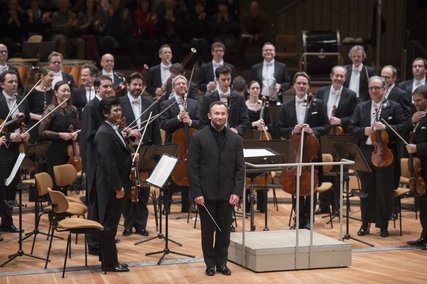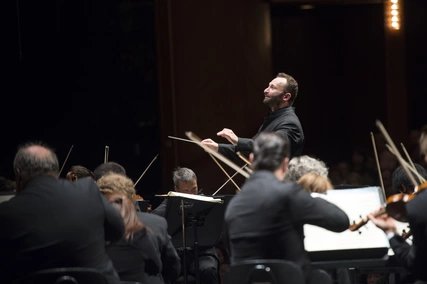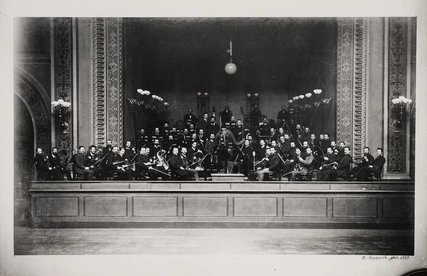
Berlin is a lively place, even now – but for the moment behind closed doors. More than in almost any other city, values such as freedom and independence are lived out in Berlin and new freedoms are created time and again. We are all aware of the controversies that arise from this, but also the fireworks of creativity. Berlin is vibrant, just as it was hundreds of years ago. We have taken a look back at the past 600 years of history for you and discovered many cheerful and powerful stories that are unique to Berlin and Berliners. Berlin has already made it through many a crisis thanks to its courage and humour, so let yourself be inspired and emboldened.
You can't put it into words...
“Words cannot express my feelings – everything from euphoria and great joy to awe and disbelief. I am aware of the responsibility and high expectations of me, and I will do everything in my power to be a worthy conductor of this outstanding orchestra.” *
– this was the first reaction of Russian conductor Kirill Petrenko in June 2015 to his election as Chief Conductor of the Berlin Philharmonic Orchestra.
The Berlin Philharmonic Orchestra is one of the world's most famous symphony orchestras, with a unique tradition of self-determination. For example, when it comes to the appointment of a new Chief Conductor.

Who will be our chief conductor?
Only the 128 full members of the orchestra vote in a secret ballot on who will assume overall artistic responsibility for them and who will shape their musical development in the future. No director or political representative is allowed to exert any influence here. Equally unusual is the fact that no official candidates are nominated. In principle, any living conductor can suddenly be promoted to being the world's top classical music conductor by a simple phone call from the Berlin Philharmonic Orchestra – if they win the election.
Who belongs to our orchestra?
The freedom and self-determination of the Berlin orchestra is also evident in other “rules of the game”: The Philharmonic alone decides on a probationary period and on the final admission of a new musician. And they have a decisive influence on the choice of guest conductors, programming and performance venues.
The struggle for self-assurance and independence: 1 May, 1882
Independence and self-assurance don't simply fall into one's lap, but rather tend to be the fruits of arduous development processes. The courageous efforts of the Berlin Philharmonic Orchestra began early, at the time of its founding:
On 1 May 1882, a group of 54 orchestral musicians were celebrating exuberantly in Berlin. They had split with their previous director Benjamin Bilse following a dispute. They all agreed that they would no longer tolerate poor pay and travelling in wooden railway carriages on tours. Benjamin Bilse was a Berlin conductor and composer of national renown, but now his orchestra refused to sign new contracts with him – a rebellious, courageous step for musicians at the end of the 19th century.
Together they decided to take a step towards independence and to bear the economic risks themselves.
Berlin beer gardens and a roller skating rink
The early days of the newly formed Philharmonic Orchestra were difficult: they played in beer gardens and in front of spa guests, later they succeeded in converting a room in Bernburger Strasse, a former roller skating rink, into their first concert hall. They were given the ancient Greek name Philharmonic – which means “love of harmony, of music”.
The first five years were marked by musical successes, but also by bitter setbacks and serious existential crises. However, tenacious perseverance and continued hard work paid off, and the orchestra finally aroused the interest of renowned greats.
The breakthrough
On 21 October 1887, the most important conductor of his time, Hans von Bülow, gave his first concert with the Philharmonic Orchestra in Berlin – as its principal conductor. And so the journey towards a glittering musical future began.
Here is the first known recording of the Berliner Philharmoniker from the following year, 1888:

But the Berlin Philharmonic Orchestra has never forgotten its past:
Every year the famous orchestra celebrates the day of its foundation on the 1st of May with the European Concert.
And even today their motto is: “We decide for ourselves!”
By the way:
- The old philharmonic hall in the former roller skating rink was bombed during an Allied attack. Its ruins were demolished in 1952 and the rubble ended up on Teufelsberg. To this day, you can find a memorial plaque at Bernburger Strasse 22a / 23.
- More exciting stories from Berlin's past can be found on our App About Berlin, free to download.
Make sure to also visit:





